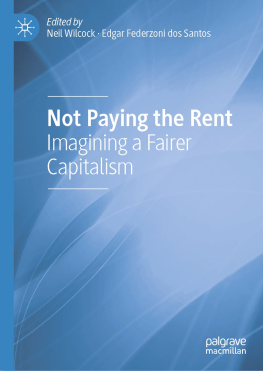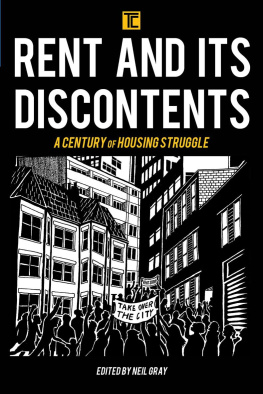Neil Wilcock - Not Paying the Rent: Imagining a Fairer Capitalism
Here you can read online Neil Wilcock - Not Paying the Rent: Imagining a Fairer Capitalism full text of the book (entire story) in english for free. Download pdf and epub, get meaning, cover and reviews about this ebook. year: 2021, publisher: Palgrave Macmillan, genre: Politics. Description of the work, (preface) as well as reviews are available. Best literature library LitArk.com created for fans of good reading and offers a wide selection of genres:
Romance novel
Science fiction
Adventure
Detective
Science
History
Home and family
Prose
Art
Politics
Computer
Non-fiction
Religion
Business
Children
Humor
Choose a favorite category and find really read worthwhile books. Enjoy immersion in the world of imagination, feel the emotions of the characters or learn something new for yourself, make an fascinating discovery.
- Book:Not Paying the Rent: Imagining a Fairer Capitalism
- Author:
- Publisher:Palgrave Macmillan
- Genre:
- Year:2021
- Rating:3 / 5
- Favourites:Add to favourites
- Your mark:
Not Paying the Rent: Imagining a Fairer Capitalism: summary, description and annotation
We offer to read an annotation, description, summary or preface (depends on what the author of the book "Not Paying the Rent: Imagining a Fairer Capitalism" wrote himself). If you haven't found the necessary information about the book — write in the comments, we will try to find it.
This is a conversational book with chapters directly followed by responses from experts. The main authors propose that the failure in development is not due to capitalism but rather rentism, which is earnings based on political rather market returns. Rent prevents development and ingrains social and economic inequalities. Using the case study of Brazils economic development, it is shown how development fails because policies Brazil and other low to middle-income countries promote do not overcome the main obstacle to development - rent. The overcoming of rent would occur within a model of globalisation whereby the advanced economics still prosper concurrently as the poorest countries grow, all underpinned by international organisations defending a rule-based globalisation.
Not Paying the Rent: Imagining a Fairer Capitalism presents a new application of the theory of rent, both historically in the case of Brazil, and in practical terms in tackling it through modern international organisations. It will be relevant to students, researchers, and general readers interested in inequality and development economics.
Neil Wilcock: author's other books
Who wrote Not Paying the Rent: Imagining a Fairer Capitalism? Find out the surname, the name of the author of the book and a list of all author's works by series.














